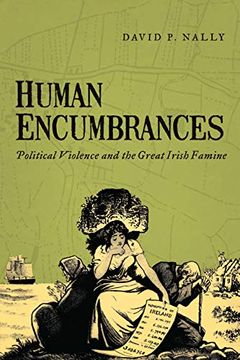Reseña del libro "Human Encumbrances: Political Violence and the Great Irish Famine (en Inglés)"
The Great Irish Famine has been mired in debate over the level of culpability of the British government. Most scholars of the Famine reject the extreme nationalist charge of genocide, but beyond that there is little consensus. In Human Encumbrances: Political Violence and the Great Irish Famine, David Nally argues for a nuanced understanding of "famineogenic behaviour" - conduct that aids and abets famine - capable of drawing distinctions between the consequences of political indifference and policies that promote reckless conduct. Human Encumbrances is the first major work to apply the critical perspectives of famine theory and postcolonial studies to the causes and history of the Great Famine. Combining an impressive range of archival sources, including contemporary critiques of British famine policy, Nally argues that land confiscations and plantation schemes paved the way for the reordering of Irish political, social, and economic space. According to Nally, these colonial policies undermined rural livelihoods and made Irish society more vulnerable to catastrophic food crises. He traces how colonial ideologies generated negative evaluations of Irish destitution and attenuated calls to implement traditional anti-famine programs. The government's failure to take action, born out of an indifference to the suffering of the Irish poor, amounted to an avoidable policy of "letting die". Acts of official wrongdoing, Nally charges, can also be found in the British government's attempt to use the Famine as a lever to accelerate socioeconomic change. Even before the Famine reached its deadly apogee, an array of social commentators believed that Ireland's peasant culture was fundamentally incommensurable with enlightenment values of human progress. To the economists and public officials who embraced this dehumanizing logic, the potato blight was an instrument of cure that would finally regenerate what was seen to be a diseased body politic. Nally shows how these views arose from a dogmatic insistence on the laws of political economy and an equally firm belief, fostered through centuries of colonial contact, that the Irish were slovenly, improvident, and uncivilized, and therefore in need of external disciplining. In this context, Nally recasts the Great Famine to look less like a natural disaster and more like the consequence of colonial oppression and social engineering.

